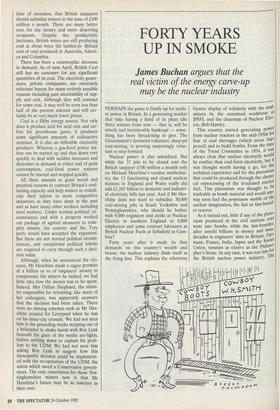FORTY YEARS UP IN SMOKE
James Buchan argues that the
real victim of the energy carve-up may be the nuclear industry
PERHAPS the game is finally up for nucle- ar power in Britain. In a generating market that risks having a third of its plant idle three winters from now — that is, will be utterly and irretrievably bankrupt — some- thing has been threatening to give. The Government's favoured volunteer, deep-pit coal-mining, is proving surprisingly reluc- tant to step forward.
Nuclear power is also subsidised. But while the 31 pits to be closed cost the British taxpayer £100 million a month only on Michael Heseltine's voodoo mathemat- ics, the 13 functioning and closed nuclear stations in England and Wales really did add £1.265 billion to domestic and industri- al electricity bills last year. And if Mr Hes- eltine does not want to subsidise 30,000 coal-mining jobs in South Yorkshire and Nottinghamshire, why should he bother with 9,000 engineers and clerks at Nuclear Electric in southern England or 8,000 employees and some contract labourers at British Nuclear Fuels at Sellafield in Cum- bria?
Forty years after it made its first demands on this country's wealth and brains, the nuclear industry finds itself in the firing line. This explains the otherwise
bizarre display of solidarity with the coal- miners by the unionised workforce at BNFL and the chairman of Nuclear Elec- tric, Bob Hawley. This country started generating power from nuclear reactors in the mid-1950s for fear of coal shortages (which never hap- pened) and to build bombs. From the time of the Trend Committee in 1954, it was always clear that nuclear electricity Would be costlier than coal-fired electricity, but It was thought worth having a go, for .the technical experience and for the plutoniuTfl
.
that could be produced through the chemi- cal reprocessing of the irradiated reactor fuel. This plutonium was thought to be tradeable as bomb material and would anY- way soon fuel the perpetuum mobile of the nuclear imagination, the fast or fast-breed- er reactor.
As it turned out, little if any of the pluw" nium produced in the civil stations ever went into bombs, while the fast-breeder, after untold billions in money and mar' decades in engineers' time in Britain, Ger- many, France, India, Japan and the Soviet Union, remains as elusive as the Philoso- pher's Stone. In any case, it was too late for the British nuclear power industry. The
early civil stations were simply plutonium factories with some feeble old steam tur- bines tacked on, and were inextricably bound in with the ex-military reprocessing plants at Sellafield, which had meanwhile grown like Topsy. These horrible birth mutations committed the nuclear industry to permanent dishonesty about their costs of operation (though this is exaggerated by successive secretaries of state, from Benn to Parkinson, who never bothered to understand the industry).
By the 1980s Sellafield had become so extravagant that even the Central Electrici- ty Generating Board noticed. BNFL was put on fixed-price contracts, which prompt- ly revealed the enormous cost of reprocess- ing nuclear fuel. It was obvious that the British nuclear power industry could not be privatised on this basis, but successive ener- gy secretaries baulked at telling Margaret Thatcher, who was thought to harbour an irrational fondness for nuclear electricity. Finally, when Parkinson's successor, John Wakeham, broke the news to her, she is said to have replied: `I always feared as much, John.'
Rather than allow the stations to go bankrupt and irradiate sections of British countryside, a brilliant civil servant at the Department of Energy devised the nuclear levy, which currently amounts to about a halfpenny a unit on electricity bills, or about L40 a year for a family with children in London.
Since the public wasn't told about this tax, and didn't find out about it till this week, the nuclear industry thought it had time to sort itself out, fix the stations that don't work well, learn to tell the truth, decide what is to be done with the nuclear waste it produces and convince the public that, since it generates no greenhouse gases, nuclear is the power source of the future rather than the past. It may not now have this time.
In one of his many dubious remarks last week, Michael Heseltine said that we must have the nuclear levy because it will pay for the nuclear stations to be taken down — which might be both risky and expensive, as nobody has yet completely done it.
Actually, the levy is mainly being spent on building a vast new nuclear power sta- tion, of a type never before seen in these shores, at Sizewell in Suffolk and on repro- cessing fuel at Sellafield. BNFL is using its reprocessing fees to build an immense neW reprocessing hall, known as Thorp, whIchA will import irradiated fuel from Japan an
u Germany and export plutonium. These buildings will also one day have to be taken down.
Behind it all is a question that's in every- body's mind but nobody dares ask, so 1 WIII• Is this country now so indigent that it can. no longer afford either of these pieces ot industrial folklore: not just the nuclear Versailles on the Cumbria coast but th_e deep coal-mines of song and fable? it doesn't bear thinking about.



































































 Previous page
Previous page